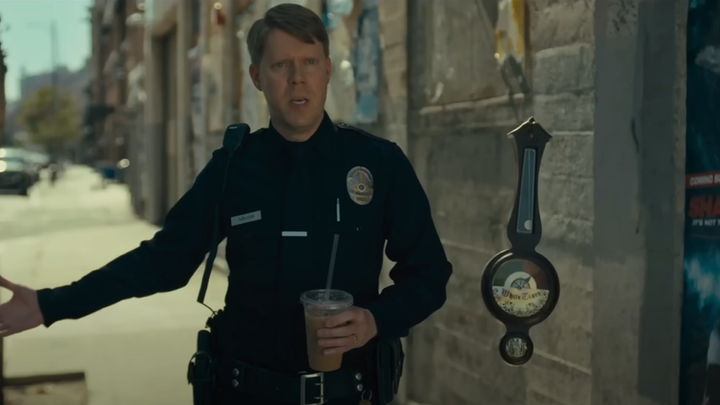The American Society of Magical Negroes is in a radical tradition of Black affirmation movies, in which we remember, back in 1969, Robert Downey Sr’s Putney Swope and, more recently, Boots Riley’s 2018 super surreal Sorry to Bother You.
This new film, with first-time direction by Kobi Libii, is released in the UK on 26 April, and is a gentler milder vehicle for sharp comments about the nature of racism as well as contemporary debates about what to do about it. There are strengths in this approach, but also limitations, and it has provoked strong reactions.
White fragility
Aren (played by Justice Smith) is the main character, a young Black man from a prestigious art college failing to make a mark at an exhibition, mistaken for a waiter and continuously apologising to the white folk there. These folk are, he is told by a wise old magician mentor who takes pity on him, “uncomfortable,” and this discomfort is to be the motif that underpins the way racism is understood and tackled.
It is very much in line with discussions of “white fragility.” That is the sense of unease that whites feel in the presence of Black people and, more so – and this is where discomfort goes off the scale into racism – when they are challenged about their privilege.
The phrase “white fragility” comes from a book by Robin DiAngelo, and has quickly been recuperated – absorbed and neutralised, turned into a soothing diagnostic instrument and guide to therapy – by psychiatric medicine. This sensitivity to race and racism, and to any discussion of race and racism, is real, and that is what this film homes in on.
The “Magical Negro” is a critical race trope discussed by Spike Lee among others, one used to name the Black character in film and TV who is there to assist the white plot while effacing themselves.
The solution the film chiefly offers for most of the running time is in line with the therapeutic angle that “white fragility” invites, and the wizardly “American Society of Magical Negroes” that Aren is inducted into plays the game with a sarcastic reasoning and practice.
If white folk feel “uncomfortable,” and that discomfort leads to so much harm – ranging from micro-aggressions to police shoot-outs – then why not soothe the whites, reduce their discomfort, and make things right. After all, Aren is told, “the happier they are, they safer we are.” We will find out that the film is playing the game to be only all the better positioned to unravel this approach’s ideological appeal.
White Reaction
As sure as night follows day, this kind of whimsical satire is now too much for some of the right-wing media outlets in the US. Fox News, for example, was fuming, with vicious comments embedded in its report on the film. They take exception to Aren being told that the most dangerous animal on the planet is not, as he says, sharks (and they are standing in front of a shark poster in this scene, a set-up for the gag), but, he is told, “white people.” This joke alone unleashed in the twitter-sphere rage about “woke” in Hollywood.

The whites on the right, at least, seem quite fragile. Fox News conclude their report with a paragraph that is difficult to stretch into satire: They refer to “a chart of the 10 stages of genocide, pointing to the section about ‘polarization’ where a group targets another with propaganda”, and claim that this is where we are with this film.
Spoilers
There is something disarmingly sucrose about the film, albeit with many barbs about the nature of racism that do touch a nerve. Sometimes hidden in the film, and sometimes in plain sight, is a critique of the activities of the “American Society.” The film combines a rom-com atmosphere with critique, plus toe-curling allusions to Harry Potter in both the scenario and music that could put you off the thing.
There is an impassioned moment when Aren finds his voice, good, but this is all wrapped in an approach to racism that side-steps joint struggle of the kind you will find in Boots Riley, and instead invites us to empathise and agonise. That, it seems, is enough to make the US right-wing media “uncomfortable.”
No more plot spoilers, except to say that you can see the end-twist coming a mile off, and that then briefly gives us a little more almost intersectional context for what Black men are going through. The American Society of Magical Negroes, which opened in March, was pulled from US cinemas after only three weeks, with the kind of very low box-office returns and dominant-site review ratings that drive films into and out of visibility. Let’s see what it does here.
Art (47) Book Review (102) Books (106) Capitalism (64) China (74) Climate Emergency (97) Conservative Government (90) Conservative Party (45) COVID-19 (43) Economics (36) EcoSocialism (48) Elections (75) Europe (44) Fascism (52) Film (47) Film Review (60) France (66) Gaza (52) Imperialism (95) Israel (103) Italy (42) Keir Starmer (49) Labour Party (108) Long Read (38) Marxism (45) Palestine (133) pandemic (78) Protest (137) Russia (322) Solidarity (123) Statement (44) Trade Unionism (132) Ukraine (324) United States of America (120) War (349)

